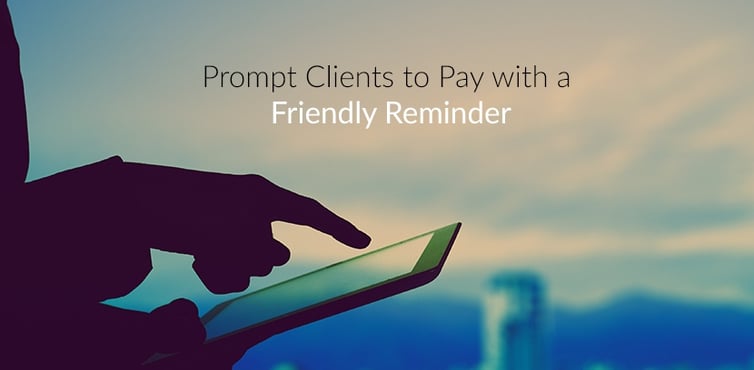
Once you've agreed to a contract and payment terms, the assumption is that you can send an invoice and the client will pay. Disappointment sets in when the payment due date comes and there's no payment from your client. This can be especially frustrating to your sales team, if it's a new client who seems to have reneged on the deal. You don't have to lose hope.
You can still prompt your clients to pay in a friendly way.
Before Due Date
There are some steps you can take before the payment is due in order to get paid on time. Keep in mind that your contract terms should include payment terms as well.
- Ask for payment up front - If you're working on a large project, you can ask for partial payment up front. Depending on the service or goods, you may be able to ask for the full payment up front.
- List late fees in your payment terms - When contract terms include late fees for delayed payment, your client will be more motivated to pay early or on time.
- Detailed and timely invoices - Sending clear and detailed invoices on a regular basis may lead your client to expect them and prepare to pay regularly as well.
- Communication - With clear communication, especially with the accounts payable department, you will have a better idea of delayed payments schedules or if there is another problem that needs resolution.
Payment Reminders
Part of communicating regularly with your client includes sending payment reminders. These reminders could be sent before the invoice is due. Use this language to prompt payment before the due date:
- A friendly reminder that your invoice #XXXX is due next week. We appreciate your prompt payment.
- In order to avoid late fees, we want to thank you in advance for your payment of invoice #XXXX, due on MM/DD/YYYY.
- We are grateful for the opportunity to work with you. Please let me know if you have any questions about your invoice due next week.
On or After the Due Date
It is vital to stay professional and courteous when attempting to prompt payment on or after the due date. Frustration or panic can begin to set in when a payment is missed because that payment may be required to pay other bills for your business. An overlooked payment may be due to forgetfulness, a lost invoice or an issue with the service or product that needs to be resolved.
- Keep communications polite - Your business relationship has taken too much effort and energy to make assumptions and get angry just yet.
- Inquire and resolve problems - Your sales team or product manager may need to get involved to ask about any unresolved challenges with your client.
- Send a collections letter - A collections letter doesn't have to be threatening. Friendly reminders may be exactly what is needed to put your invoice back in the forefront of your client's mind.
Payment reminders can be sent via email or regular mail to nudge a client into paying their invoice. Collections letters can also be sent either way but must be sent as soon as payment is due, past due and not received. The earlier you can send a reminder, the more likely you can recover the amount due.
Collections letters must be detailed, including the invoice number, the amount due, the due date and contact information for resolving. You can also include agreed upon payment types such as credit card, check, ACH or any other way that you will accept payment from your client. The first collection letter is a past due notification to alert clients that they have missed a payment. If your contract includes late fees or finance charges for late payments, this information should also be included in your first collections letter.
For a sample template to use for your business, download our free past due notification letter here.
Stay calm and courteous in communications with your client when an invoice is past due. Prompt payment with friendly reminders before moving into threats or collections agencies. In most cases, as the old adage states, you can actually attract more flies with honey than vinegar.






